Autobiography

CHRISTIAN LINDBERG AUTOBIOGRAPHY
There are fantastic possibilities in our modern world of today. For instance, to be able to write a totally authentic autobiography on Internet..... I have always been a little bit disappointed when I have read other biographies, either so polished by professional proof readers and censorship, or written by a professional writer based on interviews, and adjusted so that the publisher can sell as many books as possible. My English language is of course not as good as my native Swedish, and therefore this biography will probably include grammatical mistakes, but honestly, I don´t care whatsoever! This is MY autobiography, and therefore MY mistakes should be part of it. I hope you don´t mind, and I also hope that you will enjoy reading it. The work will grow slowly, but it will be truthful and honest!
HAVE FUN!
1. My life as a little boy

My first memory from childhood was when I was three years old. I remember having a horrible nightmare about a spider at least one meter in diameter, and I just jumped out of bed and ran to my mother. Not a very nice first memory of life...but at least a very clear one! I also remember my neighbor Stella, a little girl my age, and I remember us running around in my garden at Svitiodsvägen 4 in Djursholm, a beautiful garden full of apples, pears, cherries, raspberries and gooseberries. In the garden there was also a hut that my two elder brothers had built together with their friends, but Stella and I were too young and not allowed to go in to the hut. I can not really tell if my childhood was happy or not, but I suppose it was a mixture. I had energy like no one else I was told, and my parents had problems with me, as I never wanted to go to sleep. I was completely manic about pencil drawings, and I used to sit up in bed making drawing after drawing, mainly pictures of ice hockey players. But I was also a very sensitive child having very very close to tears, and my first day at the nursery school was a complete disaster. I felt very shy indeed, and even with the teacher trying to help me out giving me paper and pen, I just could not get myself to make a decent drawing, only a line going over the paper without a plan whatsoever. A little guy by the name Christer glanced at the drawing and started to laugh. He screamed out so that everyone heard: - What a terribly ugly drawing you have made! I immediately started to cry, and the rest of the day I was just sitting in a corner waiting for my parents to pick me up. The next day I refused to go, and I never ever went to nursery school again. That was the first time I realized that there were people without empathy, and in a way I am glad that I found out so early...I have met many people like Christer since, and even if I always feel ice cold when meeting someone like that, I know vaguely how to act to avoid getting hurt by them.... A couple of weeks later my parents bought a black Newfoundland dog, which was the sweetest thing I had ever seen. Stella did not go to nursery school either, so together she and I had our own little world in our garden, together with our dog Sasja.
There was really no music in our house, other than Elvis Presley, who my older sister constantly listened to. However, we were neighbours with my mothers uncle, doctor Clarence Crafoord, world famous for performing the first successful aortic coarctation repair ever, back in 1944. Clarence was an amateur violinist and had some friends that he used to play string quartet together with. One day when I was 5 years old I sneaked in to the room where they played and listened silently to a whole Beethoven quartet. When they had finished I told them loud and enthusiastic: -Now it is my turn to play!
I don´t remember this story myself, but my relatives always use it to describe how my musical career started. The truth however, was that it was not until I turned seven that my interest in music started, and this was certainly not through classical music:
We used to spend the summers at the beautiful island Bohus-Malmön on the west coast of Sweden, and there they had a tent cinema where they showed the Beatles film Help. I was far too young to even get in to see the film, but my two elder brothers managed to smuggle me in from behind, and the enthusiasm that I felt from this extraordinary film saw no limits. I was completely mad about the Beatles and particularly Ringo Star, and all autumn 1965 I was making drawings of Ringo, John, Paul and George. I begged my parents for a drum, and after initially buying me drumsticks that I played on everything that came in my way I finally got a little snare drum as a Christmas present. I was in heaven!!!
2. First day at school

Svalnässkolan, my first school in Djursholm
As a little boy I was pretty fast learning to read and write, although being left handed I insisted on writing from right to left. I was also particularly good at maths and had an extraordinary memory for names, numbers and melodies, so my mother thought it would be appropriate for me to start a year early in school. My first day in school however, brought back memories from nursery school with the horrible drawing incident, and before I knew it I found myself sitting at my desk crying and sobbing. I remember feeling complete panic, and tried to hide under the desk, but suddenly a tiny little voice screamed out: "Christian is crying!" It was my neighbour, Andrea Wallenberg, and the teacher came right up to my desk...this could of course have created a trauma for the rest of my life, but here I met the most compassionate eyes ever. Berit Olsson was her name, and she told the rest of the class that she was going to have a little chat with me outside the classroom. She was the sweetest, kindest teacher one could imagine, and she managed to calm me down, go back in to the class room and leave all frustrations behind. The rest of the day I remember as one of the best in my life. We played soccer on the lunch break, and having long hair like the Beatles I was as popular as could be, and all the girls in the class chased me and wanted to kiss me, as they did in all the Beatles movies....not a bad start for a little kid who at first had panic about even going to school in the first place.
3. Some tough years to come
As I said before I was always overly filled with energy, and if I could not find anything good to use it on I got rather frustrated and naughty. Summer 1966 my father was ill, and had to stay in hospital in Stockholm with my mother, while aunt Siggan took care of us kids at the summer island Bohus Malmön. Siggan and I never really got on well...she did not like my long hair, and insisted on washing it with cold water every evening. Without having the permission I always left the house on my own to go and play with much older kids, and I even had some very strange love affairs with 12-13 year old girls. This is also when I got in contact with cigarettes, something that I thought was incredibly cool and exciting. I had a very naughty friend called Per, who stole cigarettes from his mother every day, and we smoked like chimneys. Coming home from the summer vacations I was of course eager to show my friends Palle and Jocke and Pasi my new discovery, and in the forest almost every day we smoked cigarettes building up a stupid and dangerous addiction, an addiction that will stay with me for the rest of my life. Not long after we started this hooligan habits my mother started to find out, and even if I was incredibly good at hiding bad behavior and bad consciousness with my big innocent blue eyes, she started to get worried about me. My parents decided I should start in music school to study the drums properly. I started to take lessons, and my teacher put me in a military band playing Sousa marches. I found it almost unbearable, and asked mother if I could quit. We went to the teacher who suggested that I tried a melodic instrument, since he thought I seemed to have some musical talent. He gave me a trumpet, and again placed me in the military band. This was possibly even worse actually, as the band was not particularly good, and to play the same part as two other trumpeters who had not tuned beforehand was something of the worst I had ever experienced in my life so far. Eventually I asked my mother kindly if I could please quit. The teacher begged, saying that he had never met such a talented student, but my mother approved and let me give the trumpet up. I was now around 10 years old, and my great hobbies were cigarettes, girls, soccer and being a hooligan. Why on earth these destructive hobbies??? Well, I believe there was an explanation:
I sometimes wonder how important various specific incidents are for if a person becomes a hooligan or not. I have a tendency to believe, like Dalai Lama, that human beings are born good, but by hurting each other we bring in evilness to the world, and that evilness in turn will be passed on from one person to another leading to all the misery in our confused world. Aunt Siggan´s behavior obviously triggered bad things inside of me, as did Berit Olsson something good and beautiful. If she had not been so warmhearted on my first day in school, if I then had experienced the same ice cold lack of empathy as in nursery school, what would then have happened the first years in school?? I was lucky at that point of my life, but later on, in my fourth school year it was time again to meet the ice cold and true evilness, like the guy in nursery school: It was my new schoolteacher! The first thing he said to me when I met his cold eyes and shook hands was: "I take for granted that you will cut that ugly hair you have. This kind of hair is not accepted in my classroom". I remember the ice cold feeling I got inside my body, but managed to keep calm and cool. I had already made up my mind not to give in, and loose to a looser like him, like I did in nursery school to Christer! I let my hair grow even longer, but the price was extremely high. He started on a daily bases to penalize me, and we had a clear ongoing war between the two of us, all ending up in a discussions with the head of the school. A poor little boy student has of course no chance whatsoever against a teacher employed by the head of school, and the end result was that they took the decision to move me to another class, as that might teach me to "become a proper human being" as they said. My quick and direct response was loud and clear so they really understood who stood in front of them: "I am already a proper human being thank you!!" Now, being a grownup, I can easily see the link between this idiotic grownup behavior and my wish as a child to revolt against it and become a hooligan!
I thought, by not being confronted anymore with my great enemy wanting me to cut my hair, that life would get easier. No way! The new teacher turned out to be even worse! A retired military general who decided to become a school teacher was to become my next challenge in life, a man who obviously hated this little Beatles figure with blond hair and blue eyes even more than the previous teacher. It was not easy to meet completely new classmates and to find a way to get accepted, but as I new I was good at drawing I took the chance in the drawing class to work energetic and with enthusiasm. I was making drawing after drawing, and the teacher came to my desk to look. He choose one of the drawings and showed to the class. I felt YES! Now everyone will be impressed, BUT! This is what he said:
- Look here, what our messy little newcomer has done! Christian! Never ever make a complete drawing without showing it to me and get it approved, Here you have made one silly drawing after the other, and that way you are making no progress whatsoever. Shame on you!
Instead of helping me get accepted in the class he made me feel completely stripped naked, and my chances of being approved by testing classmates were much smaller after this. But even worse, I completely lost my biggest interest: since that day I have not made one single drawing or painting, except for the ones I was forced to do in school.
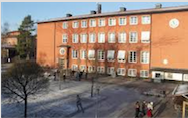
Vasaskolan, my second school in Djursholm
The new classmates were accepting me in general, but from being the leader personality in my previous class, I became somewhat a secondary figure, and even if I had been a leading soccer left forward scoring goals all the time before, my new classmates would not even let me play in their top team of seven. At the same time I was constantly reminded of my messy long hair by the teacher, and he took every opportunity to nail me down, as he was obviously a good friend of my previous teacher. So...what did a 10 year old boy, full of energy, do with all this?? Well, first of all I hated to go to school, and tried every possible trick to pretend I was ill. It worked pretty often( I used to put the thermometer in the morning tea), and the days that I was at home I just LOVED! What I did was listening through ALL my vinyl records of the Beatles over and over again! I just could not get enough of it: "Please Please Me", "With the Beatles" , "A Hard Days Night", "Beatles for Sale", "Help", "Rubber Soul", "Revolver" and "Sgt Peppers Lonely Hearts Club Band", those were the eight vinyl records that I owned, and I had even planned the day so that I could listening to all of them three times each(they lasted in average 45 minutes per record), if I started at 6 O´clock in the morning and ended at midnight, but then that would have to be non stop.
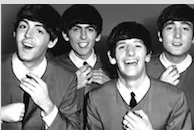
The Beatles, my first musical inspiration
School was in these years something very grey and boring for me, and I struggled to be accepted in this cruel world. I was OK in most subjects but not brilliant at anything, so outside school was where I really lived my life craving for acceptance and some sort of credit as a human being, and I got in contact with some older guys that did robbery and were real outsiders. Being with these guys was what gave me satisfaction and a sort of very strange self confidence, but I got in to all sorts of trouble: They needed cigarettes and told me that the first thing I had to do to be accepted by them was to somehow get hold of a box of 200 cigarettes, otherwise they would punish me. I was stupid enough to make a plan:
My old friend from earlier years, Pasi, had a father who always bought tax free cigarettes on the boat when he came back from his native country Finland. Once when I was alone with Pasi in their appartement I took a moment when Pasi visited the restrooms to look through his father´s drawers, and there it was! A box of 200 cigarettes which I quickly put in to a bag that I had brought, and the next day, I showed to my mafia friends that I passed the test. They were not very nice to me, just took the cigarettes and gave me another test to pass: Next day they took me to the public bath, Ösbysjön, and I had to go in to one of the changing rooms and steel cash from some ones wallet. They were waiting outside, and said that if I did not get back with some money they would beat me up. I went in, was actually not nervous at all, and found 50 kronor in a wallet which I stole and took with me. Unfortunately on the way out I was caught!! An man called Hans-Gunnar Axberger owned the wallet, stopped me and asked me why I did it. Of course I could not answer, and my, so called, friends had quickly disappeared. Actually, I was very lucky: he was a very nice human being, just said that he wanted to talk to my parents. He called them and asked them to come and pick me up so he could talk to them, and said that he will not go to the police, but for him it was very important to meet with my parents so that they and I could sort this out. Curiously enough, today this man, Hans Gunnar Axberger, is one of the highest person in the justice system in Sweden! My father and I had a serious talk that evening, and I also told him about the box of cigarettes that I had stolen. We agreed that I should call Pasi´s father and tell him that I stole some cigarettes and personally go over with a new box and an apology. Pasi´s father became furious, said that I was a criminal and that he would go to the police. However, after one hour on the phone with my mother they finally accepted the apology and I went to Pasi with both my parents to give the cigarettes back and apologize.
4. A Choir Boy
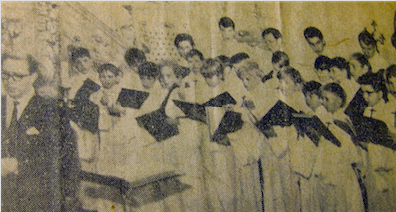
St Eriks Gosskör
My parents was struggling with me. They tried very hard to get me out of the grip of older hooligans and in to some organized musical activity, as they had seen what excitement music gave me. I resisted and refused, until one day, when the mother of the star singer of the class(he always stood out in the music lessons as the nightingale) asked me if I would like to join and make an audition to the very famous St Eriks Boys Choir in Stockholm. I had nothing else to do that day, and joined them, not really because of the audition, but rather to get a ride in to the city for a change. To every ones surprise I did not only pass the test, I nailed every single thing in the aural test, and according to the choral master this was the best aural test he ever experienced. So, suddenly I was transformed from one of the schools worst hooligan to a choir boy! It felt a bit strange, and at first I did not want to go to the rehearsals, but the wonderful eight part pieces by Mozart, and singing the solo in Mendelssohn´s Hear My Prayer was motivation enough to keep me going to the many many rehearsals and chuch services, and best of all: This kept me from becoming a criminal! Better to prove yourself through music than through crime.
However, happiness seldom stays for long. After a summer camp with the choir a rumor started to circulate that the choral master had a week point for boys, and it all ended up as a major scandal dissolving the choir and having the choral master escape to England. So, back to square one, my parents continued to try hard to keep me away from the bad guys and boost my interest for music, but I was not really in to it. I tried piano lessons for a while but found them utterly boring, so I was back again in a grey zone without really any drive in life, except for when I listened to the Beatles, smoking cigarettes, chasing girls or staying out with my friends the hooligans.
5. Summer at Mollösund and back with my old classmates

Mollösund, where I had my greatest youth memories
Beginning of the 70s my brightest memories were from the wonderful little village at the west coast in Sweden. Every summer we rented a house there, and I just loved getting away from school and meeting up with my friends who in general were a lot older than myself. We played a lot of soccer, did lots of swimming and having wonderful parties where I fell in love basically every week and had dozens of beautiful romantic relationships making me a better human being, with stronger self confidence and calm soul. Coming back to Stockholm was always a struggle, but finally, when reaching 8th grade I managed to change back to my old classmates, and finally my life was back to normal. Magnus Wirström, Sven Sahlberg, Pasi Hahmo, Cecilia Asklund, Margareta Söderberg, Dagge Laurell, Bengt Strokirk, Hamid Ghatan, Mats Andersson(now Theselius), Martin Wulff, Urban Dahlberg, Cecil Haking and I had an incredible time, doing everything that teenagers do and more. We were not worrying at all about the marks in school, but socially we were learning skills for life, and I think all of us did pretty well in our life as grownups.
6. Suddenly struck by the Power of Music
One day after school Martin Wulff and I were chilling out in his house listening to music. I don´t remember what we listened to, but suddenly his father came in and said: Why are you all so limited in your taste of music? Have you ever heard Louis Armstrong and the Hot Five? Martin and I gave it a chance and were both completely knocked out! Without even knowing how, we became completely jazz fanatics, and decided to start a group called Hot Frogs. We called our friends who played instruments and got a group together consisting of trumpet, piano, clarinet and saxophone, so what was left for the two of us to play were the string bass and trombone. My mother called the music school in Danderyd/Djursholm/Täby and I managed to borrow a Buecher trombone from them. Martin bought a double bass and we started to practice. We managed to copy Basin Street Blues from the 78s that Martin´s father had, and I sang the song that Jack Teagarden sang. To learn the trombone solo was a bit harder without really knowing the positions, but I was getting pretty close for being just a beginner.
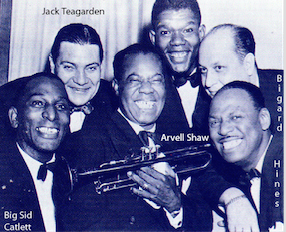
Louis Armstrong and the Hot Five
The enthusiasm that I felt for this music was very similar to what I felt for the Beatles in the 60s, and I decided to try to get a really good teacher. I already new the trumpet player in the philharmonic John Eriksson who I had some trumpet lessons from before, and his son who at that time was 26 was said to be the best trombone player in Sweden, having won the principal trombone position at the Royal Stockholm Opera only 17 years old, so my mother asked him if I could get some private lessons with him. I was his first student, and we found each other immediately! He taught me in an absolutely brilliant way, and I was now starting to practice in a very disciplined way, dividing my practice in three sessions per day, morning before school, afternoon before doing my homework and evening before going to bed. The result was stunning! After only three months I was accepted to join The Nordic Youth Orchestra in Lund, and was even chosen to play a frantically difficult solo in Siegfried Naumann´s piece Ungdom for Sax Solo, Trombone Solo and Orchestra. Naumann later wrote me a post card saying he thought I was one of the most talented musicians he had come across, which of course to me was a chock!! I really did not know what to do with this now, as for the first time in my life I felt a burning wish to become a professional musician.

Siegfried Naumann
I started to take composing lessons, cello lessons and piano lessons on top of the trombone lessons, and my goal was to become a composer and conductor. However, not everyone was as positive as Siegfried Naumann. When my mother called Stig Westerberg, the conducting professor at the Royal Academy, and told him about my talent, energy and enthusiasm for trying to become a conductor he just laughed arrogantly and said that there are many people who are talented, and before I should even think of studying to become a conductor I should first finish a music teacher´s degree, a counterpoint degree, a piano degree and a soloinstrument degree, so even though I thought he was stupid, I decided to forget about conducting but continue my ambitions with the trombone and my composition studies. Thorsten Nilsson was an excellent composition teacher, and I learnt all the basics pretty fast, but when presenting my first composition attempt (a brass quintet) to a chamber music teacher, I was faced with a similar reaction I got from Christer in nursery school. He told me clearly that very few people have the gift to become composers, and I was certainly not one of them. I was extremely embarrassed and promised myself that I would never again compose a piece of music. I was now left with the ambition to become a trombonist, and Sven-Erik Eriksson was a dream as a teacher! After only 8 months he recommended me to play first trombone on a two week tour with the Gävleborg Symphony Orchestra under Rainer Miedel, and I made an audition playing second trombone in Dvorak 8th Symphony. I still remember the 16th notes at the end!!! Wow! I had no idea how to fix it, and I am sure it sounded pretty rough, but Miedel accepted me and I was engaged for my first professional tour as a musician!
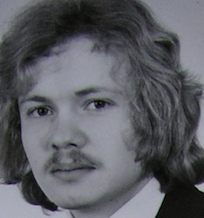
Sven-Erik Eriksson, my first trombone teacher 1975
7. Fighting three different personalities inside of me resulted in the biggest crisis of my life
I was in highschool, had only played trombone for a couple of months and was going on a three week tour with a professional orchestra, but when I got the music I realized that I had never played anything written with a tenor clef before. My teachers in school were worried I would get behind in maths, physics, biology etc, my friends at school thought I deserted them when I was practicing instead of having fun with them and I myself was scared to death making a fool out of myself in the orchestra. The day before the tour was to begin I got 39.8 on the thermometer and suddenly had to cancel the whole thing! It was a huge backlash for me, I took it very hard, and suddenly I felt I had to make a decision. Once the fever was down to normal, I quit school to concentrate 100%. on music, My mother´s cousin, concertmaster of the Stockholm Philharmonic had told me that trombone was not the best instrument to make a musical career on, so he suggested I also tried other instruments, so I started manically to take up my old instruments again and practiced 3 hours trombone, 3 hours piano and 3 hours cello per day, but after 3 weeks of this intensed discipline I started to have problems sleeping. Despite this I continued, as I saw no other option catching up with musicians who started when they were six or seven, but the sleeping problems got worse and worse. It actually went totally overboard: I did not sleep for one minute in five days, and I started to get hallucinations. I saw huge tigers coming in to my room attacking me, and finally it went so far that I had to be put in to the hospital.
I got very strong medicine forcing me to sleep, but what followed was three weeks of pure hell! Hallucinations got worse and worse, I had no sense of what was day and night, and I was sure that I was actually put in to prison, and that the nurses were from the police. In my phantasy a huge clown was constantly walking in and out of the room, through the wall, and he was teasing me all the time, telling me how stupid I was, and how impossible my situation was. Finally he told me: "You are sentenced to death for canceling the tour with Gävle Symphony Orchestra!"
At the same time the doctor came in to give me my sleeping pill. I was sure this was a death pill, so I fought like hell not to take it, and they actually had to tie me to the bed before they finally forced the pill in to my mouth. It was an absolutely horrible feeling!! I was totally convinced this was the last minutes of my life, and particularly thought about my friends Hamid Ghatan, Mats Theselius, Cecil Haking and Martin Wulff, picturing them on the funeral throwing flowers on the grave. Just before I totally fell asleep I once again had the most horrible hallucination: I saw Mats Theselius leaving the grave and I screamed at him: I AM STILL ALIVE!!! But he could not hear me. The grave diggers started to through dust on my face and bit by bit I got covered and finally I could not move at all. My last thoughts were realizing that one part of my body after the other gave in and became dead flesh. The last part of my body that was still alive was my right eye and my left cheek. Then everything was black!
After these three weeks of pure hell I arrived at the youth psychiatric department of Danderyds Sjukhus and had to share room with a guy who was 15 and had been sniffing paint thinner since he was 6, so not too much intellectual exchange with my room mate. He was like a teenager with a brain of a five year old, so very sad indeed, and quite a chock for a 17 year old boy from a very protected world in Djursholms Samskola. The only thing that was good with this period on the hospital was that I got to see a very clever and pleasant psychiatrist who told me I was in no way anything else than heathly and sane. I was only a young man with lots of energy, high demands on myself and highly sensitive, a sensitivity that would be very useful should I make it as a musician. We talked about my situation and I realized that my personality right now was divided in three:
1: The one being with friends, even being the leader of the pack that always stayed latest at the parties and slept until two o´clock in the afternoon on Sundays.
2: The one who felt it was important to get good grades in school and manage to get a decent job.
3: The one who obviously had a musical talent, but a talent revealed so late that it was going to be an enormous challenge to succeed as a professional musician.
The psychiatrist also thought I had to slowly get back in to a more relaxed view on life. She finally made me realize that the personality who partied had to give way for the two others, and since it was too risky to leave highschool without knowing if I could make it as a musician she advised me to go back to school. Fortunately, there was a school in Stockholm called Adolf Fredriks Musikklasser, where on top of the general subjects one also did five hours of choir singing per week and advanced music theory as a subject. It was frantically difficult to get in, particularly in the middle of a term, but my mother persuaded the dean of the school to let me make an audition. I remember preparing Rimsky-Korsakov Trombone Concerto and impressing the music teacher so much with my aural test that he immediately accepted me, and even asked me if I would like to play Rimsky-Korsakov Concerto at a ceremony for the government. Of course I was totally thrilled! On the first row I saw our Prime Minister Olof Palme, and in the second movement he even had tears in his eyes!! Quite an experience for me.
In Adolf Fredrik I met several new friends, and friends with a different attitude to life (two of them are today very successful colleagues of mine: Bengt Rosengren, solo oboe in the Swedish Radio Orchestra and in my own Norwegian Arctic Philharmonic Orchestra, and Håkan Ehrén Solo Bassist in the Royal Stockholm Philharmonic Orchestra. The party atmosphere in this school was completely different. Almost all student were totally committed to getting good marks, and that inspired even me to be less of a rascal, so I gradually got used to live without the manic night life of Djursholm. Very soon it was time to apply for the Royal Stockholm Academy of Music, and in May 1976 I stood there shaking in front of a very dour jury having to play Ferdinand David Trombone Concerto. Having played the last note I was sure I had failed, but suddenly the old trumpet teacher Göran Åkerstedt bursted out in an enthusiastic speech to me.
- Not since 1963 have I heard such an exceptional audition here at the academy. There is only one place available here, so I feel very sorry for the other applicant who also played pretty well, but they are completely slautered by your audition, and you are more than welcome to start 1st of September at the soloist class here at the academy.
It was a total dream come true! Just a couple of months before I lay in total panic at the hospital thinking I was going to die, and now I had been accepted as number one at the best Academy of Music there was in Sweden, having played trombone just a little over a year!
8. My first relationship and "The First International Brass Congress", Montreux 1976

Some of the amazing artists at the first brass congress in Montreux
A month after I won the audition I started my first relationship. To decide what to write about your own private life in an autobiography is difficult. You want to be honest and give a full picture of yourself, yet when you write private things including other people you have an obligation to be sensitive. Therefore I took the decision not to include any of my intimate or private relationships in this autobiography and hope that you nevertheless will get a good picture of the person I am behind my trombone, my conductor´s stick and my compositions.
Something I will write about though, with enthusiasm, is "The First International Brass Congress" held in Montreux Switzerland June 1976! It was an incredible eye opener for me. Together with my friend, the trumpet player Jan Ankarmo, I bought an inter-rail ticket (this was an extraordinary possibility for a young person these days: you payed only 360 Swedish Kronor and could go anywhere you wanted throughout Europe within a month) and went to Montreux. There we experienced together something completely unique. For the first time in history a group of brass players from around the world gathered together to promote their instruments, instruments that had been in the total shadow of string instruments, piano and woodwind in classical music. Harvey Philips, the tuba player, took this bold initiative, and together with the magazine Brass Bulletin and other brass organisations around the world, he created a fantastic forum, where seven of the greatest player in the world on each brass instrument performed for an audience of devoted brass enthusiasts. I was probably the most enthusiastic of them all!
I will never forget Denis Wick performing live Gordon Jacob´s Trombone Concerto, Michael Lind playing Carnival of Venice, Timofei Dokschitzer in Arutunian Trumpet Concerto, Tomas Stevens and Roger Bobo in Reynolds´ Signals for Trumpet, Tuba and Brass Choir, Jay Friedman and John Marcellus playing Mahler 3 solo, Barry Tuckwell Saint-Saëns "The Swan"(the only piece he played all week) Phil Wilson and Rich Matteson playing from their album "The Sound of The Wasp", Berio Sequenza played by Vinko Globokar(This was not fair however! It should have been played by Stuart Dempster who initially inspired Luciano to write this piece) as well as a joke by the percussionist in Phil Wilson´s band: He went completely bizzard on his drum and as a comment on Berio´s "WHY" in Sequenza, he stopped suddenly and said : WHY NOT!! And there was much much much more, all in the same week and at the same venue! On top of that all the artists held informative masterclasses, and I even got a chance to try every single instrument brand there was in the world, as there were fantastic exhibitions from all the companies that made brass instruments. A little curiosity from this brass gathering: I met a 13 year old boy from Malmö playing the trumpet who was even more fanatic than me. Together we practiced Eugène Bozza´s Quatre esquisses for trumpet and trombone in every single break we could find! That trumpeter was Håkan Hardenberger.
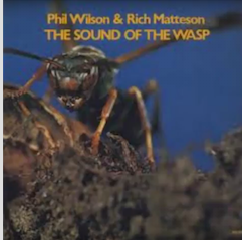
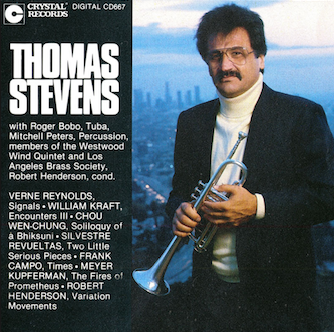
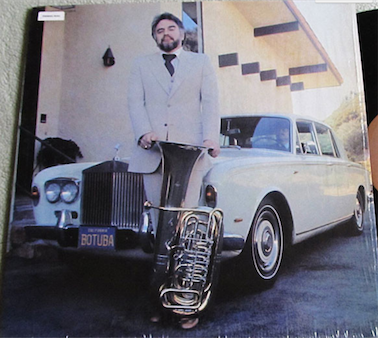
Some of the Vinyl Records I bought in Montreux 1976
Coming home to Stockholm I was completely filled with inspiration and I practiced as much as my lips could take all summer on my Bach 36H wich Gert Crafoord, my mother´s cousin the concertmaster of Stockholm Philharmonic, had bought for me at Giardinelli´s in New York during their tour to the US that year.
However, I missed someting important during these masterclasses: There was no one that talked about the links to other art forms! It seemed to me that many brass players (not all though, and I don´t want to generalize and sound like a snob!) did not have any kind of intellectual background. My parents had always said to me that you can not be a true artist if you have not seen the most beautiful paintings in the world, read the greatest books every written, seen the most haunting theatre plays there is, or experienced the great classic ballet dancers live. I felt in Montreux, that when I talked about these things to people, they just thought I was strange and they made jokes of me. This made me feel quite lonely actually, a feeling that I came back to many times again during my career as a musician. Being an individualist however, I just did not care too much of what they said, and having just been through most of Dostojevsky´s books, Strindberg´s greatest classics and much more, I continued my reading when I came back from Montreux and happened to come across the book that has made the greatest impression on me in my entire life: Balzac´s Lost Ilussions! What a phenomenal description of human beings, of an artist and his struggle! I must say, that if there is one book that you should read if you are to develop artistically as a musician, this is the one!
Many people have asked me why I happened to be so successful compared to other brass players, and thinking carefully about it I must say that I think the intellectual part of it might be one of the secrets. When I was a student I always went to museums to watch paintings, saw the theatre plays there was to see and read as many great books as I could ever get my hands on. I am 100% sure that this intimate contact with the arts made me just a little bit more interesting for people to listen to. Scientifically I know it perhaps does not make sense, but luckily enough art is something entirely different from science.
9. My first year at the Royal Academy of Music in Stockholm
Coming to my first lesson at the Academy was a huge chock! The teacher was a nice, very friendly old man smoking pipe all the time, but he had absolutely no clue on how to teach the trombone. The fact was that he had been more or less fired from Sergiu Celibidache´s orchestra in Stockholm, the Swedish Radio Symphony Orchestra, because he could not play soft enough in the beginning of Stravinsky Firebird, and to be nice to him the so called Trombone Mafia at that time in Stockholm had lobbied him in as a teacher at the academy. The only thing he ever said to me was that I had a very nice vibrato that I should keep, and that my musicality was wonderful, so I just had to continue to practice and everything would be fine. So, the only way to survive was to continue my private lessons with Sven-Erik, but even more ridiculous: It was against the rules of the academy to take lessons outside the academy! And they apparently were very strict about this, so you could risk being thrown out from the school!
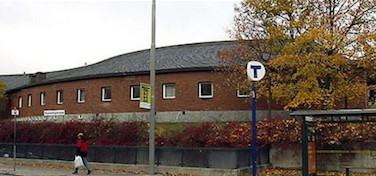
The not so beautiful Royal Academy of Music in Stockholm 1976
So, still going to the totally useless trombone lessons at the academy, I had to have a secret life traveling out to Tyresö where Sven-Erik lived and pay for private lessons. But the useless pipe smoking teacher was not only hired as a trombone teacher, he was leading the brass ensemble at the school, and the same thing happened here: we just played through piece after piece, took a break for his pipe smoking and played through some more pieces. One day a horn player in the ensemble lost his temper, stood up and screamed all he could: This is totally ridiculous, you are incompetent, and we are not here just to play prim a vista, we need to learn how to play brass ensemble in a professional way. Either you start to teach us something, or we go to the dean and ask him to fire you! This horn player was Lennart Stevensson, and that day he became one of my very best friends. We still spend new years eve, summer vacation, easter and other holidays together!
Lennart and I went to the dean, but unfortunately nothing happened whatsoever. I guess in a way the dean had his hands tied when it came to Swedish law and really could not do much, but we, the students, were totally frustrated and did not really know what to do. Anyway, having met Denis Wick at The First International Brass Congress I decided to write to him and ask him if I could come to London to take some lessons.
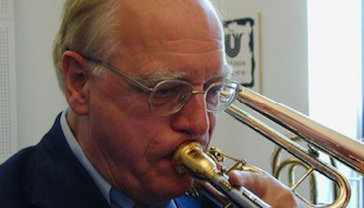
Denis Wick, my second teacher
Denis replied almost instantly with a very positive, encouraging and polite letter saying he would be honored to teach me, and after having read the letter I was jumping up and down in total euphoria! I went to the dean again (Naively enough, I had gotten an impression that he understood our problems with the teacher, even if he could not do anything) and asked him if I could get permission to be free three weeks in January the coming year to go to London and meet what was at that time considered the greatest trombone teacher in the world. The dean said no! I WAS FURIOUS!!
So: what would you do in my position? Risk being thrown out of school or just obey the rules? I took the bold decision and went to London without caring about the consequences. The lessons were absolutely stunning! Denis was so positive and enthusiastic, and he taught me some very valuable things about holding the slide, how to practice the high register, how to practice using the air properly, and also how to keep a positive and winning attitude towards music. When I came home from London I had grown enormously as a player, and on the 7th of February 1977, the week after I came home from London I did my first audition: to the Royal Stockholm Opera Orchestra. I did this just for the experience and had no hope whatsoever to even go to the second round, but to my complete surprise I succeeded and got the position! So...I did not need to be worried about the academy any more as I was going to start my position in July with full salary including holiday supplement! I was in heaven!
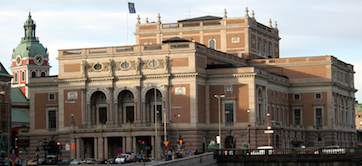
The Royal Opera House in Stockholm, my first workplace
10. Heaven and Hell at the Royal Stockholm Opera House
Being only 19 and starting as a professional trombonist after having played only for two years was not easy. The Music Director Berislav Klobučar, as well as two of the trombone colleagues, were heavily against giving me the job, as they thought I was too young, but my teacher Sven-Erik supported me and fought for me in a very heroic way. Nevertheless, being only 19 having moved out from home living on my own in a 24 square meter flat, living a professional life side by side with colleagues with an average age of 55 put an enormous pressure on me. Particularly tough were the six hours long operas performances starting at 6 o´clock ending after midnight. Playing Puccini was of course wonderful, but also frantically difficult, as every bar was rubato, and different almost every night depending on the moods of the singers. I particularly remember a moment of huge pressure: Sven-Erik my teacher was going to play Tosca, an opera I never rehearsed or heard before and got sick. They called me one hour before the performance and I had to play 1st trombone right at the performance in one of the most difficult opera there is to play as an orchestra musician! My brain was like a 1000WATT light bulb, and it felt like driving a Ferrari on a very small winding road in 285Km/h. Sensational in one respect, and thinking about it afterwards I am quite proud of having managed it, but at the same time incredibly frightening, so in short just like the title of this chapter: being in Heaven and Hell at the same time. However, thinking back I must say that I forgot most of the unpleasant incidents of this year, and to be part of Götz Friedrich´s staging of Wagner Meistersinger with over 300 people on stage was nothing else than a total kick! When the orchestra played at it´s best it was really like being in heaven.
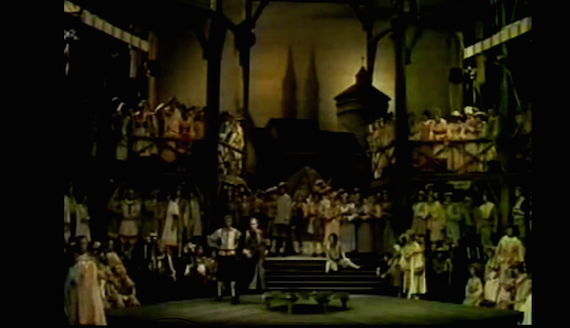
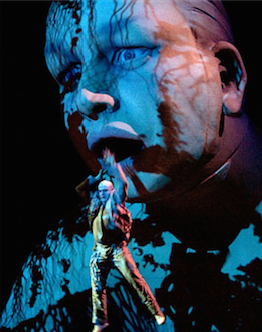
Two of the most memorable operas experiences I had as a professional: The World Premiere of Ligeti´s "Le Grand Macabre" and Götz Friedrich´s staging of Wagner Meistersinger .
But it was also frightening to see how conservative the atmosphere at a workplace like the Stockholm Opera House was. During the rehearsals of "Le Grand Macabre" by Ligeti (written specifically for the Stockholm Opera House and a true milestone in music history) the orchestra was in uprising state. Ligeti was there, and I remembered my trombone colleague whispering about Ligeti when he was present at the rehearsals: "If he gets close to me I am going to hit him right in the face". Almost everyone at the opera hated the music, hated the libretto, hated the stage setting, they hated just about everything in this piece. After having rehearsed the piece with orchestra musicians complaining and protesting, my own impression was pretty mixed, but as we were two teams in the trombone group, I finally got a chance on a free day to go in to the audience space and see one rehearsal. IT WAS SPECTACULAR! The most incredible, creative, fun, exciting performance I had ever seen in my life, and the music just made a huge impression on me. Today this opera has become one fo the most succesful operas of the 20th century, staged at most great opera houses in the world, but in Stockholm the resistance was so huge that out of the twelve planned performances five or six was cancelled due to open protests from people in charge of the PR at the opera. Such a shame!
Telling colleagues about my enthusiasm for the piece did not go down well at all, in fact I was sort of freesed out for a while after having told them my view. Getting closer to the dark months in Stockholm, November and December, I started to feel the winter depression creeping in to me. If I was so different from my colleagues when it came to musical taste, was this Royal Opera House really a place for me to spend the rest of my professional life? Well, to be fair, there were some absolutely exceptionally good musicians in this orchestra, solo clarinetist Sölve Kingstedt, one of the greatest musicians and human beings I have come across, Hasse Björkman, the horn player who always seemed to look at the bright side of life but nevertheless took his own life, Sven-Erik Eriksson, my teacher who always played with accuracy, precision, sound quality and power that I never again had heard any trombonist manage, the tuba player Christer Palm who´s sound was like smooth silk, and who still is one of my best friends. These musicians were true heroes, who devoted their lives to be a brick in one of the greatest art form there is: Opera. So, why cold I not find enough satisfaction here? Well...ultimately it came down to the fact that I could not stand chords being out of tune without fixing them outside work hours, but the people who actually were responsible for the notes out of tune were not at all interested in working outside payed hours, even if the result was not 100%. I don´t blame them, but just realized I was different.
So, I was at a working place where some moments could be like being in heaven (I must say some of the performances we did of Swanlake were the most euphoric moments in my life) and some could be like in hell, when one of the older brass players was drunk and played out of tune in one of the heavenly beautiful chords of Wagner´s Parsifal. Once again I want to point out that I don´t blame these older musicians who had been doing their duties for 30 or 40 years and maybe played their 500th performance of Parsifal, if they took a glass or two...but I guess I have the right to say I suffered enourmously from the bad intonation that came as a result.
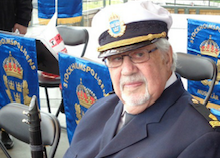

Sölve Kingstedt and Christer Palm, two of my favorite colleagues at the Royal Opera House
Anyway, half way through my first year I was asking myself: Do I really want to be a musician? I looked carefully at three options:
1. Accept the fact that to earn your living as a musician with a trombone in your hand you would have to make compromises. With that goes accepting being part of a mediocre performance one night and a great one the next, without having any influence on what it would be.
2. Go back to school, try to find another job and continue music as a hobby.
3. Try to reach the unreachable: To live as an independent musician, always true to a vision of how it should sound, create opportunities where mediocre performances was not an option and refuse to be part of anything that was not artistically rewarding.
The first option seemed the most comfortable solution, the second the most practical and the third totally crazy. The way things suddenly developed at the Royal Stockholm Academy of Music at that particular time gave me an option to think a little bit more, something I will explain in the next chapter...11. The Ugly fight about the position as trombone professor at the Royal Stockholm Arademy of Music.
11. The weird fight about the position as trombone professor at the Royal Stockholm Academy of Music.
Something really unexpected happened. The trombone professor at the Royal Stockholm Academy of Music got ill, and his illness was so severe that it turned out that he would actually not come back again. The first thing I want to say now is that he was the most gentle human being you could ever think of. It was not his fault he was placed at this job, and to see him get ill was very painful, but at the same time I hope he was at least relieved not to have to live under the pressure of the students expecting him to deliver something he was not able to deliver...
As I had won the audition at the opera the two other orchestras, The Royal Stockholm Philharmonic and The Swedish Radio Orchestra asked me rather frequently to sub in their orchestras, and I enjoyed immensely to work with them. I particularly remember playing Rite of Spring under Raphael Frübeck de Burgos, and Tchaikovsky Symphony no 5 under Yevgeny Svetlanov.
But all this were to change drastically! Suddenly, like hyenas waiting for the lions to leave the antilope they had killed, the trombone cartel as I decided to call them, went after the Professor´s position.
To save the players doing all this, and anyone who is close to them, I will be as vague as possible about who did what, when sharing this information. I will only tell what did happen, and hopefully the people who were guilty of those in my view unacceptable actions will read it, digest it, and at the same time understand that I do not want to be offensive in any way. I understand that ambition and selfishness are characteristics we all have, and sometimes we act before we think!!
In any case, here is the story: Immediately when it was known that the trombone professor was ill, one of the trombonists in the trombone cartel(I have decided to use this name for a group of very ambitious and career oriented musicians in Stockholm, no names mentioned) went up to the management of the Royal Music Adademy telling them who was going to be the next professor, and that the whole Stockholm trombone establishment agreed that this particular person should get the job. The only things was that 100% of the students at the academy disagreed! Since I had won the job at the Opera everyone had followed my example and took private lessons with Sven-Erik, so all the students wanted Sven-Erik to get the job. Immediately when I heard about this I asked for a meeting with the dean at the academy, who now had seen my success and therefore was ready to listen to what I had to say. I told him that we absolutely must not make the same mistake as 20 years ago, when a fired trombonist got the job because his friends wanted to make sure he got an income. I told him that the only way to appoint a new professor was by announcing it openly, but also to have each candidate make an audition playing his instrument and also teaching one of the students at the academy in front of an impartial jury. The trombone cartel was absolutely furious!!! How could Christian Lindberg, this little arrogant fellow from Djursholm have any influence over the academic world and dictate how The Royal Stockholm Academy of music should appoint their professor of trombone? What gave me the right to have a view on how to handle an application for a professor´s job? Well...fortunately the dean listened to what I had to say, and even if I did not manage to convince him of the necessity of a playing audition among the candidates, I managed to get him to agree to having each candidate to the job make a teaching audition with an independent jury listening, reperesented by teachers, students, independent musicians and the dean himself. The result of this audition was crystal clear!! Sven-Erik Eriksson did a marvellous teaching audition, and got all the votes from the jury, and the fact that he got the job resulted in creating a whole new chapter in the history of trombone in Sweden! Håkan Björkman, Jonas Bylund, Karl Frisendahl, Mikael Oskarsson, Åke Lännerholm and many other trombonists, would not have reached their professional positions if Sven-Erik would not have been at this job, that is absolutely 100% sure!
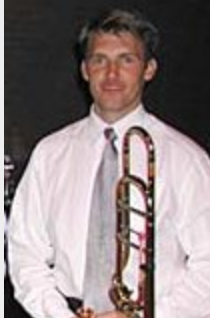
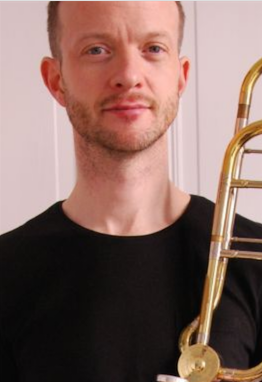
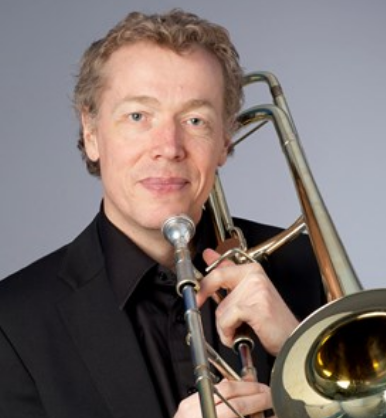
The three trombonists from Sven-Erik Eriksson´s trombone class who won the principal positions in Stockholm, Håkan Björkman, Karl Frisendahl and Mikael Oskarsson.
Looking at this in retrospective I must say I am rather proud that I managed to get this through against the will of the trombone cartel, but it did not pass by without punishment. One of the orchestras called me and asked me to go with them on an international tour, and this tour was one of my worst experiences as a professional trombonist. Every day of the tour I got hints about how wrong I had behaved, and what a disaster Sven-Erik was as a teacher. And during the rehearsals and concerts they constantly complained to me that I could not play in time or in tune, or that I played too loud or too soft. At the end of the tour I had totally lost my self confidence and sat in a corner of the hotel bar drinking beer on my own, when suddenly one of the older trombone players being a substitute on the tour, a trombonist whom I always have respected and liked, came over to me and asked me why I was so sad. I told him I felt completely useless as a trombonist and wanted to quit playing. Please Christian, I have seen everything, and you should be proud instead of being sad. Of course they are angry for what you did, and want to retaliate, but you really did the right thing. These things happen when people get ambitious and greedy, and it is really just going to backfire on them in the long run.
I was very surprised that this guy had seen and understood the whole thing, but at the same time I felt sort of liberated. This was the moment (after realising how successful I was in implementing a fair audition for the professor job at the academy) when I thought about quitting music and become a lawyer. I was so upset when thinking about what could have happened should I have not intervened, and I felt that becoming a lawyer would give my life a much better purpose than continuing playing the trombone in an orchestra, particularly if I would have to live with colleagues treating me in such a way. And since the consequences of my actions was that neither the Stockholm Philharmonic nor the Radio Symphony Orchestra called me in again as a substitute I seriously questioned whether continuing trying to make a career in an orchestra even was an option!
12. Making a choice for life
Unfortunately history seems to repeat itself now when Sven-Erik is on his way leaving the Royal Stockholm Academy of Music, but I will come back to that in a later chapter. As you have realized from above, the experiences I had so far with the music business was not all overwhelmingly positive, so right now there was time for reflection and true evaluation of what to actually do with my life. Was it worth the struggle fighting for "The Arts" the same tough way that my parents did, was it better to try and get a stable job in an orchestra and on the side of the orchestra try to get artistic fulfillment, or was it even better to do something entirely different, like becoming a lawyer, and just have music as a hobby on the side?
Well...for sure I did not want to work in an orchestra in Stockholm after the inflammatory situation with the job at the academy. If I were to work in an orchestra it would have to be somewhere else, where I could start from scratch. I was constantly asked by orchestras outside Stockholm and enjoyed immensely to play in these orchestras. One of my absolute top experiences was when I got a chance to play Petterson´s seventh symphony, one of the true Scandinavian masterpieces, together with Tchaikovsky piano concerto. The soloist was the phenomenal pianist Nikita Magaloff and I remember his encore, the Chopin Nocturne I was just practicing myself at that time, and I was completely knocked out! This still remains in my brain as one of the greatest musical performances I ever experienced. A strange thing happened thow: In the middle of rehearsing Magaloff just stood up and screamed to the conductor: "Who is that horrible clown that can not keep this together?" It was quite a chock to all of us, but he was right...it was one of these conductors who changed the business in such a terrible way, believing that one does not need to rehearse, also teaching a whole generation of conductors that things take care of itself. Those kind of conductors unfortunately has become quite popular today, as they save rehearsal costs for managers, and makes the lazy musicians in orchestras happy. Magaloff was totally different, a perfectionist wanting to work on each little detail. Other great experiences playing in orchestra was when I was asked to play Mozart Requiem, a piece that I played a dozens of times with different orchestras. Usually they asked me to play both the first trombone part and in addition to this switch to tenor trombone for the second trombone solo in Tuba Mirum. I just loved doing this every single time. Particularly memorable was the performance with the Norrköpings Symphony orchestra under Jukka-Pekka Saraste, a conductor that later became a very good friend.
Since I felt quite comfortable and happy in these different orchestras I made an audition for principal trombone at the Stavanger Symphony Orchestra in Norway, today one of the greatest orchestras in Scandinavia with a brilliant brand new concert hall just built for them. I won the audition and of course was very happy indeed to be a winner, but the strange thing that happened within me right then was astonishing. I found myself completely paralyzed....the orchestra congratulated me to the job and asked me to sign the contract, but just like a man in doubt when going to the altar to swear to his wife for the rest of life I just said: NO THANKS. I do not want the job...!
 ¨
¨
The Stunning Concert Hall in Stavanger where I might have ended up had I decided to become an orchestra musician
You can probably imagine what an embarresing situation...particularly for the orchestra, but of course also for me!! I still feel guilty for this, it was a great orchestra, and I had travelled there to audition and then only when I got the job I realized I did not want it. I really want to apologize to this great orchestra, it had nothing to do with them, just the fact that right at that moment, however much I liked the symphony orchestra and its stunning repertoire, I realized that I was not suited for being an orchestral musician.
So...then what were the options?? Well...I had this dream of being an independent musician, true to The Arts, and true to musical integrity, but I was also very down to earth knowing how difficult such a path would be to take. I decided the only decent thing to do was to go back to the Royal Stockholm Academy and finish my studies there, and for security take a full academic degree in teaching the trombone. It was fun, I enjoyed particularly the piano lessons with the wonderful Judith de Frumerie, married to the famous composer, the harmony lessons with Bengt Olof Palmqvist and the great pedagogical lessons with Sven-Erik and other competent teachers on this subject. In two years I finished my master degree in teaching with highest points in all subjects including piano, an instrument that I guess I only mastered those particular months that I practiced it as hell for the exam...today my fingers has unfortunately forgotten all the signals that made me able to play all these beautiful Chopin Nocturnes, Beethoven Sonatas, Bach Inventions and more!
But my dream of being an independent musician still lived within me! And at the same time I was seriously considering studying law at the university! Very very difficult choices, choices that just a month before I turned 20 I had decided to make up my mind about.
Finally, I decided to go full speed towards becoming an independent musican, and promised myself to give this dream full attention until I was 30!! If I were to fail I could still re-think as a 30 year old man and become either a teacher, take up studies again and become a lawyer, or even make auditions to orchestras if I were to change my view on orchestral playing. I did not yet believe I could make it as a full time soloist, so my goal at this moment was to put my shares 50% on a career playing brass quintet and 50% trying to support myself from solo appearances. We had already for a long time had a brass quintet called John Eriksson´s Brass Quintet, and as I had a brother in London who was Professor of Lute at the Royal College of Music, I discussed with him the possibility to go with the quintet to study in London. My brother was very helpful and I proposed to our quintet that we take one year off in Stockholm, apply for all kinds of scholarship to go to London and study with the famous Philip Jones Brass Ensemble. At first everyone thought it was a completely crazy idea, but my enthusiasm was so contagious that four of the five members agreed. Only one member was still questioning the idea, but when the four of us said we would go without him, he finally agreed and we were off to London! We applied like maniacs for every single scholarship there was available, and I myself put a very ambitious application in to the prestigeous one year British Council scholarship. In competition with over 100 applicants in all fields (mathematics, history, science, you name it!) I was one of the lucky two who won this fantastic scholarship and I was in eupohoria!!

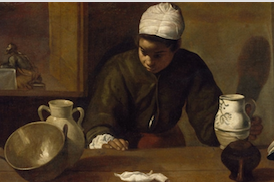
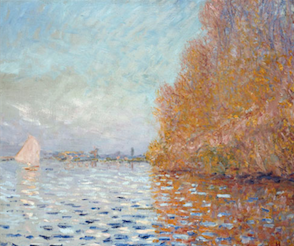
The National Gallery at Trafalgar Square, my favorite place in London to go and watch great paintings by Monet, Velasques, Rembrandt, Van Gogh, Seurat, Goya and many more!
The scholarship was no less than amazing: A monthly salary for a year, free lodging, free lessons from any trombone teacher in London, free concert tickets to all venues in London, free travels within London, free access to all museums in London, and three free tickets back and forwards Stockholm-London. I must say that this year was one of the best in my whole life, and I will always be so thankful to the British Council for giving me this chance in life to deepen my understanding of The Music, The Arts and The Literature, all the important things in life that makes us decent human beings, less violent, less corruptive, less aggressive and more tolerant!! Even if I believe that simple human goodness can live without intellectual development, I am convinced that educating people in Arts, History, Culture and Literature are great preventors against wars and conflicts in the world. I certainly learned a lot about life this beautiful year in London 1980-1981. In the next chapter I will explain more.
Not until I started to live in London it was clear to me what a provincial city Stockholm actually was. Immediately when I saw that the best conductor I ever worked with in Stockholm, Yevgeny Svetlanov, was to conduct The London Symphony Orchestra I went to see them. It was the greatest thing I had ever seen up until then, and I went to see Denis Wick afterwards telling him "Is this not the greatest conductor ever?" He smiled at me slightly and told me "then you have not seen much...", and he was true! The next day the critic in the London Times completely crushed Svetlanov for being sentimental and not caring enough about details. I asked John Iveson at my next lesson with him, who said the same: "Wait until you experienced, Claudio Abbado, Klaus Tennstedt, Bernard Haitink, Günter Wand, Zubin Mehta or Carl Maria Giulini. They are rehearsing properly with orchestras, Svjetlanov just plays through at the rehearsals and do not care about details."

Next evening I went to see Klaus Tennstedt in Mahler 6 with The London Philharmonic, and was totally knocked out! A totally new dimension, a level that I had never imagined possible. Not a single note out or tune, not a split note, a string section with a body from heaven, woodwind playing with enormous enthusiasm, brass and percussion with power like 15 Ferrari Testarossa! Now, one has to realise that this was a golden age. In 1980 London was the classical music center of the world, and every night I could go listen to the absolute top class soloists and conductors in the world. I heard Yo Yo Ma 25 years old making his London debut in Dvorak Cello Concerto, I heard Chicago Symphony with a young Georg Solti, I heard Berlin Philharmonic with Karajan when he was still at the top, I heard a young Abbado, a brilliant Haitink, a magic Seiji Ozawa, and all of them were hungry, performing with an energy as if it was a matter of life and death. It was great time for The Arts in Great Britain, but unfortunately this was not to last very long.
.png)
When Margaret Thatcher was elected in 1979 everyone believed her when she said "there will be no candle-end economies in the arts." Unfortunately she lied, and as a result this whole golden age of classical music in London disappeared year by year. The cuts in funding were so significant, that towards the end of the 90s there was almost nothing else to do for orchestras there than to invite conductors paying for themselves programming Nutcracker Suite, Swanlake Suite, 1812, Beethoven 5, Beethoven Violin Concerto and Haydn Trumpet Concerto over and over again with cheaper and cheaper soloists. The world class conductors and soloists only occationally came for the coffee money that was left for the promotors to offer. As a result the top international artists went elsewhere, and in a very short time London had become provincial while the new classical music center in the world was now Tokyo, where a whisky and beer company in collaboration with the Japanese government 1986 had built the worlds greatest concert hall, Suntory Hall, with an accoustic even superior to Musikverein in Vienna, Carnegie Hall in New York and Goncertgebouw in Amsterdam.

Suntory Hall, where I had the fortune to both perform and record for Deutsche Gramophone the concerto that Toru Takemitsu wrote for me in the 1994.
I had the fortune to be part of this enormous boom in Japan´s classical music scene. A wonderful man with the name of Genroh Hara sent me a letter in 1990 telling me he wanted to arrange my Japanese début. Since then I was back every single year in the 1990:s, and there I performed with great conductors in great halls, and went to concerts after concert providing me with the same quality and international level as I experienced in London 1980. Unfortunately, the Japanese economy broke down at the turn of the century, and Tokyo lost it´s position as the worlds best place for classical music concerts. Today, when every single government in the world follows Margaret Thatcher´ s example, we do not have anything in the whole world equal to London 1980 or Tokyo 1994. Classical music today is more about selling yourself via publicists and hoping that one of the few mainly commersially driven concert agencies will think that you are good looking enough to sell, or sticks out in some way, or simply pay for your career yourself. Neither conductors, nor soloists are hired for their values as a true artist, and a conductor who argues that he can make the same result with one rehearsal as with 3 days are the conductor that gets the gigs. Cynical but unfortunately true. (I will get back to these sad stories more in depth later in my autobiography.)
However, in London 1980-81 the rules were completely different. This was the place where conductros and soloists loved to perform, to work hard, and to give their whole heart to great performances on world class level, and it was a perfect place to be for a music student like me.
14. My First Lessons: Total Eye Openers!

